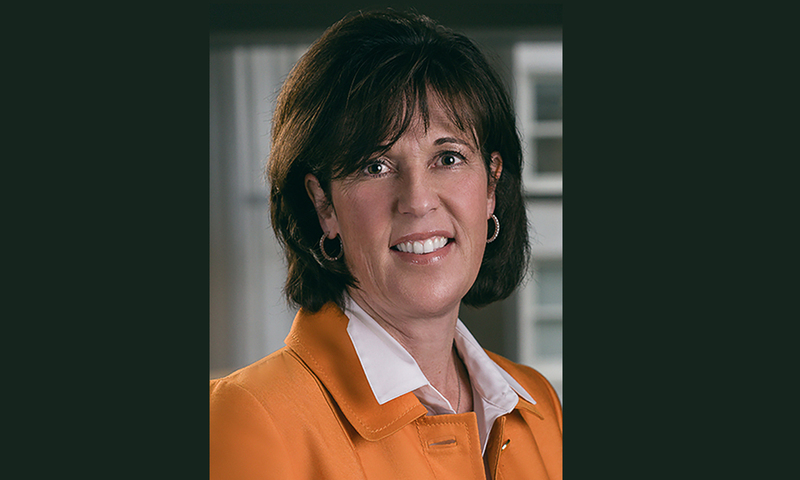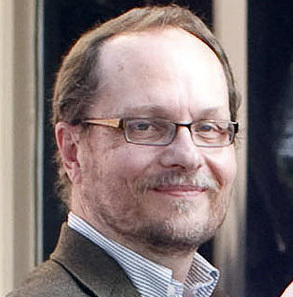Patty Ross, senior executive and thought leader in corporate talent and operations, has a philosophy of leadership that sounds poetic but is the result of hard lessons and deep self-examination.
“What is a leader? She lifts others up,” said Ross at a Crowell Distinguished Speaker Series event. “She accepts praise as easily as she gives it. She leads, teaches and guides. She follows, learns and walks beside her friends on any adventure. She values the metaphor of a mirror. She holds it facing inward to reflect her own knowing. She faces it outward, to help others recognize themselves. She creates and ponders excellent questions. When she asks a question of someone else, she listens hard to the answer. She knows listening does not equal agreeing. She is confident enough to disagree without being disagreeable. She is courageous and never uses the word failure; she just tries another way. She's admired and she has the grace to be embraced. She is unique, authentic, inspiring, and utterly enjoys being herself. She/he is a leader. She/he is us.”
In Fall 2019, Ross shared her thoughts on how awareness of both God and self are crucial to becoming an authentic leader. During a 34-year career with Nike, Ross led everything from strategy and business development to organizational change management to business operations. Her last role was vice president of workplace design and connectivity.
“In 2009, after many years at Nike, I had a pretty significant wake-up call,” said Ross. “The company went through a substantial layoff. Many of the people who remained didn't know where they fit in anymore and had lost their confidence. The leaders who used to support and advocate for them were gone, and now they were turning to me, and I realized that I was now expected to show up as a leader and be someone others would go to for advice.”
In this situation, Ross began to examine her core values and asked herself whether she was being intentional in her work.
“Probably the hardest question of all was: What was the cost of my living to work, versus living for impact and purpose?,” said Ross. “The costs were pretty significant. My health was severely compromised. I was traveling all over the world working ridiculous hours, [with] no balance, one click away from a heart attack or stroke. The relationships I cared about most either ended or were negatively impacted. I had lost touch with how I wanted to live my life and who I was living for. I found myself unable to be fully present for the people in my life. I realized that I was no longer a light in people's lives. I was just there.”
Ross decided she needed a change. She resolved to let go of the false stories she was telling herself, that she needed to work harder and live for the expectations of others. That life-altering change of perspective began with God.
“When I made that big decision in 2009, it was following a four-day silent retreat,” said Ross. “I had to get alone and get quiet and get reconnected with God. I was walking a labyrinth outside, and the Biblical character of Esther came to me. At that moment, I realized that I had to use my voice. I needed to be courageous. I didn't know how; I was scared, but I realized that I could no longer just rely on what others thought I needed to do, and I committed to being Spirit-led. I decided I was no longer going to play small or play scared or be afraid of making a mistake or of not being good enough. I wasn't going to allow my title or position in the organization to limit me in doing the right thing and I wasn't going to disregard or compromise my wellbeing and the relationships I cared most about. This was the moment for me when I think I became an authentic leader.”
Currently, Ross is a board director at MMC Corp, a national commercial construction services company, and Nautilus, Inc., a global technology-driven fitness solutions company. She holds a Bachelor of Science in Business Administration from Portland State University, and an Advanced Management Certificate in Business Management and an Executive Education Certificate in board membership, both from Harvard Business School. Ross also recently collaborated with Apple as an executive advisor for talent management, engagement, retention, inclusion and diversity strategies.
She shared three principles on being an authentic leader.
- “First of all, know yourself,” said Ross. “Have a sense of who you are, as an integrated and whole person. That means having a clear understanding of what is important to you and what you stand for; your priorities, your boundaries, and your non-negotiables. Then, make sure that your behaviors, actions, presence, and words support that vision of who you want to be. Be really careful about how you talk to yourself and the words you use. Once you become clear about who you are, what you value, and where you're going to spend your energy, it will become clear to others, too.”
- “Second, surround yourself with role models, including accountability partners and people who are going to speak truth into your life,” said Ross. “My success has been due mostly to the people who have surrounded me, and also my faith. I grew the most when people gave me the hardest and most direct feedback.”
- “Then, finally, ignite your passion,” said Ross. “Look for the unexpected and create opportunities. Dream, explore, have fun and try. Hold up a mirror, and try to objectively see what you're doing and where you might be holding yourself back. At least once a year, I try to put myself in a situation that is completely outside my comfort zone; sometimes it scares me to death, but it makes me a better leader.”
The Crowell Distinguished Speaker Series brings a selection of accomplished business leaders to campus to share their varied professional and personal insights and provides the opportunity to network with fellow attendees including alumni, MBA mentors, faculty, and current and prospective MBA students. The event is always free and open to all. Future events can be found on the Crowell events calendar.
Learn more about Crowell's business programs and Bachelor of Science in Business Administration.
 Biola University
Biola University


.jpg)
.jpg)
